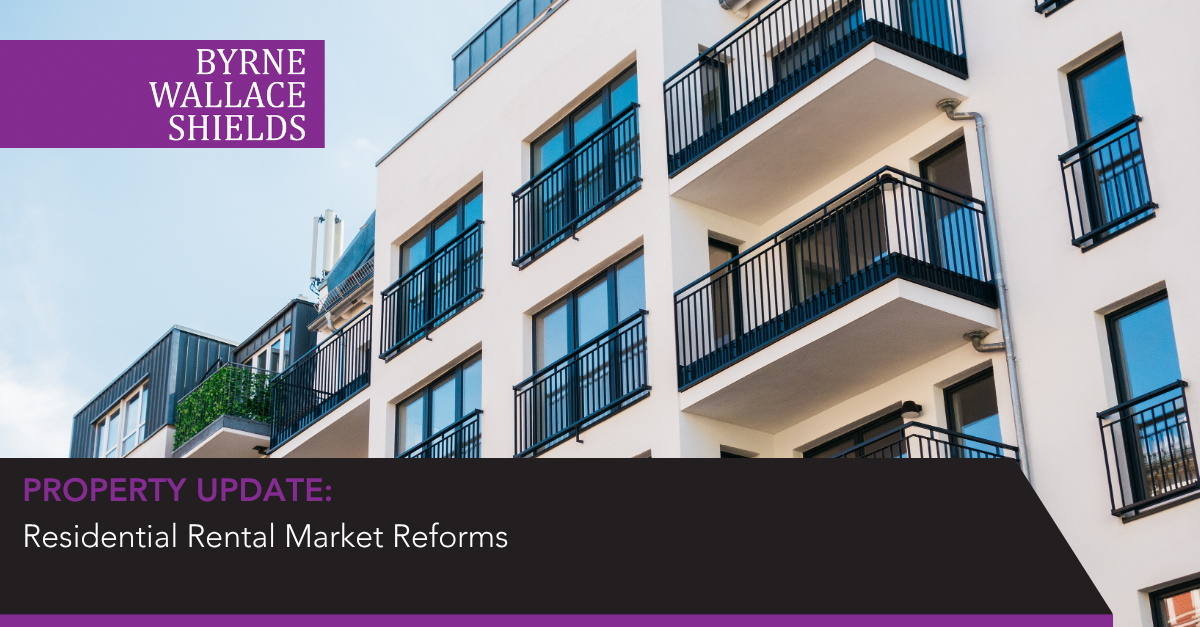Residential Rental Market Reforms Update
Tuesday, 04 November 2025
Welcome clarity has been brought to the types of accommodation which the new rules will apply to, and specifically in relation to Student Specific Accommodation, where there was some uncertainty as to whether the proposed changes included this asset class. The new rules will apply to private rented housing (including accommodation let under HAP and RAS), Approved Housing Body tenancies, cost rental tenancies and Student Specific Accommodation. Local authority tenancies and instances where a renter shares a property with the owner are excluded.
A summary of the key information released by the Department of Housing, Local Government and Heritage on 4 November is as follows:
- Tenancies of minimum duration (TMD) for new tenancies created after 1 March 2026 shall be introduced and shall arise once a tenant is in place for 6 months. A TMD is a rolling 6-year tenancy and shall apply to all tenancies, regardless of the size of the landlord. Termination of a TMD will only be permitted in a limited number of circumstances, depending on the size of the landlord. The concept of larger landlords (4+ tenancies) and smaller landlords (3 or fewer tenancies) was introduced in June 2025.
- Larger landlords shall only be allowed end a tenancy for specific reasons – the two reasons provided are breach of tenant obligations and the property is no longer suitable. They will no longer be able to terminate a tenancy because they want to sell the property, move in themselves, or allow a family member to do so, substantially renovate the property or change the use of the property. If a tenant leaves the property of its own accord, the landlord may use the property as it wishes.
- Smaller landlords can only end a tenancy during the 6 years for specific reasons (e.g. hardship, homelessness, require it for an immediate family member, returning from abroad, breach of tenant obligations, property no longer suitable). Once the 6-year term has expired, they may end a tenancy for broader reasons (e.g. selling, substantial refurbishment/renovation, landlord/family member use, change of use).
- Changes to rent increase rules. From 1 March 2026, there will be nationwide rent control. Rent increases will be linked to inflation according to CPI and a 2% cap will apply during periods of high inflation. As flagged in June, the exception to this is newly built apartments which were commenced after 10 June 2025 which will not be subject to the 2% cap, but rather their rent increases will follow CPI only. Again, clarity has been brought to the Student Specific Accommodation Sector with confirmation that this sector will also benefit from the same exception.
- Student Specific Accommodation (SSA). Given that student tenancies/ licences generally change every year, the new rent controls for SSA from 1 March 2026 shall be tailored to account for this. The rent increase restriction will therefore apply to all SSA during the first 3 years of operation of the new national rent control. It is not proposed to allow SSA providers to reset rents upon the commencement of each new student licence. The resetting of rent to market value can only be done after 3 years and after every 3-year period thereafter.
- Rent Resets for landlords. These will be allowed when a tenant leaves voluntarily, a tenant breaches their obligations, the home no longer meets their needs (e.g. size, accessibility) or at the end of each 6-year tenancy. A rent reset will not be allowed however after a “no fault eviction”. This is being introduced to prevent landlords from evicting a tenant to increase the rent.
- Sale of properties by landlords. All landlords can sell their rented property with the tenant in situ, or they can sell with vacant possession when a tenant has left of their own choice. Smaller landlords may choose to sell their property with vacant possession at the end of each 6-year TMD for a limited time before a further 6-year TMD begins. They may also choose to sell their property with vacant possession in limited circumstances due to financial hardship.
For more information, please contact Clair Cassidy, Partner, Property Law Team at Byrne Wallace Shields LLP.
RELATED PEOPLE
RELATED SERVICES
RELATED LINKS

